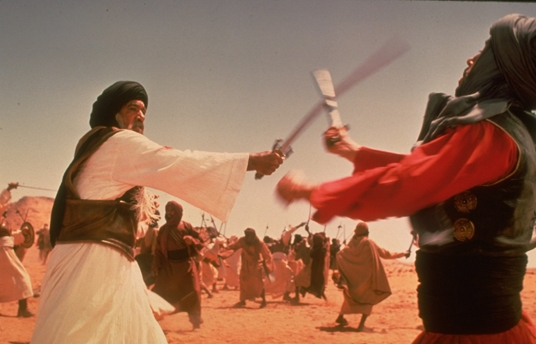نقد سينمائي: الرسالة
15 يوليو 2013

بقلم عباس موسى
لم يترك فيلماً دينياً يتحدث عن سيرة الإسلام تأثيره على المشاهد كما فعل فيلم “الرسالة” للمخرج الراحل مصطفى العقاد. فقد أراد إيصال الرسالة إلى كل العالم بعد حوالي 14 قرناً من تاريخ نزول الوحي على الرسول الأكرم.
لقد كان فيلم “الرسالة” التجربة السينمائية الأولى للعقاد في عام 1976، واجه في سبيل إنجازه الكثير من المصاعب، لكنه استطاع في النهاية أن يطلق إلى العالم واحداً من روائع السينما في كل الأوقات، فحقق منذ إطلاقه نجاحاً عربياً وعالمياً ليعتبر بحق الوثيقة البصرية الأبرز والأهم حول تاريخ نشأة الإسلام والدعوة المحمدية.
ولمن لا يعرف الكثير عن فيلم “الرسالة” أو لم يتسن له مشاهدته حتى الآن خصوصاً من الأجيال الجديدة، فيمكننا القول بأنه واحد من عدة أفلام زخرت بها السينما العربية في الخمسينات والستينات والسبعينات وتناولت مواضيع دينية عامة وأخرى عن سيرة شخصيات إسلامية بارزة.
يروي الفيلم نشأة الرسول محمد في قبيلة قريش ويظهر تلك الحقبة الجاهلية بما فيها من فساد وكفر وظلم، وسعي الرسول لتبليغ رسالة الله وتحقيق العدالة الإجتماعية والإنسانية، ويظهر شخصيات المسلمين الأوائل والمشقات الكبيرة والآلام التي مروا بها في سبيل الرسالة، وفي المقابل سعي أثرياء قريش للحد من انتشار الدين والتنكيل بهم للمحافظة على نفوذهم ومصالحهم ومناصبهم. وتتوالى الأحداث من فترة ما قبل ولادة الرسول مروراً بولادته وحياته الأولى ثم نزول الوحي وبدء الرسالة والهجرة وما تلاها من أحداث مفصلية شكلت المسار الأساسي لرسالة الإسلام وصولاً إلى مرحلة تثبيت ركائز الدولة الإسلامية ووفاة الرسول الأكرم لترسم لوحة تاريخية متكاملة وموثقة.
أنتج الفيلم من نسختين واحدة بالعربية وأخرى بالإنجليزية، وكانت العربية من بطولة عبد الله غيث في دور حمزة بن عبد المطلب أما الإنجليزية فمن بطولة أنطوني كوين. والبطولة النسائية الممثلة السورية منى واصف في دور هند بنت عتبة وأدت الممثلة العالمية أيرين باباس الدور نفسه في النسخة العالمية. وبلغت تكلفة إنتاج الفيلم للنسختين العربية والأجنبية حوالي 10 ملايين دولار أمريكي، علما بأن الفيلم ترجم إلى 12 لغة.
عمل على كتابة السيناريو نحو ستة كتّاب أبرزهم الإيرلندي الشهير هاري كرايغ، وأبدع الموسيقار الفرنسي الشهير موريس جار في الموسيقى التصويرية، ليرشح الفيلم لجائزة أوسكار لأفضل موسيقى تصويرية.
وللحديث عن الفيلم لا بد من تناوله من ثلاث زوايا محورية يمكن أن تشكل للقارىء النواحي المميزة والفريدة التي تضمنها، وهي: الناحية الإخراجية والشكل والأسلوب، ناحية المضمون والبعد الديني الذي يركز على نشاة الإسلام ورسالة الرسول الأكرم، والناحية الروحية المتجسدة في قيم الإسلام الإجتماعية والعبادية والتفاعلية مع الأديان الاخرى. واستطاع العقاد برؤيته الفذة من مزج هذه العناصر الثلاث في فيلم واحد، ليحقق مبتغاه ورؤيته التي طالما حلم في تجسيدها على أرض الواقع.
استعان العقاد في فيلمه بشركات ومؤسسات عالمية وموارد ضخمة من ممثلين وأكسسوارات وملابس غيرها من مستلزمات الفيلم. وحرص على تقديم الفيلم بإخراج مميز يختلف عن ذلك المعتاد في تلك الحقبة، فقدم المضمون بقالب إخراجي مستوحى من التصور الهوليوودي. يتميز الفيلم بديكورات ضخمة ورؤية إخراجية أقرب إلى السينما الواقعية التي تنقل التاريخ كما هو ببعده الديني والتاريخي والمحلمي، ساعده في ذلك الحبكة المتقنة والحوار الذي يخدم الأحداث التاريخية وتسلسل الوقائع. والفيلم لما يحتويه من مشاهد وصور ومعارك، فإنه بدون شك يرتبط عضوياً بأفلام الحرب المحلمية، ويستمد جماليته الإخراجية من هذا النوع وواقعية المشاهد وعرض الجيوش والمعارك وتلاحم الجنود، التي تشبع الإدراك البصري والحسّي عند المشاهد وهي عنصر ضروري لجذب المشاهد للفيلم والتفاعل مع المحتوى.
وكون الدين الإسلامي يحرّم ظهور صورة وصوت وظل الرسول الأكرم وشخصيات إسلامية اخرى منها العشرة المبشرين بالجنة، فقد استعاض العقاد عن ذلك بالحوار بين الشخصيات والسرد القصصي، فعوض عن الحضور المباشر لهذه الشخصيات بطريقة مبتكرة. وكذلك استعان بصوت الراوي الذي يوجز بعض الاحداث ليوضح للمشاهد بعض التفاصيل التاريخية والوقائع المهمة في السيرة.
ولما كان “الرسالة” موجهة للمشاهد الغربي لتعريفه بنشأة الإسلام والرسول بقدر توجهه للمسلمين، مرر العقاد رسالات الإسلام العديدة سواء بطريقة مباشرة أو غير مباشرة، فنرى المسلمون نموذجاً للتآخي والتعاون والمساواة بين السيد والعبد وبين المهاجرين والأنصار ودعم روح الجماعة، والدعوة إلى احترام المرأة وتقديرها والتأكيد على أهمية دورها وتضيحاتها (سمية أم ياسر) ومحاربة العبودية (بلال بن رباح) وهدم الطبقات والتساوي ونشر قيم التسامح وحسن معاملة الأسرى في الحروب وإعطاء الامان (خلال فتح مكة).
ومن الرسائل المهمة الأخرى تلك التي صورها العقاد في حوار جعفر بن عبد المطلب مع نجاشي الحبشة فيرتقي المشهد على احترام الأديان وتقاطع الديانات السماوية في قيمها. وفي هذا كله ومضات تحمل مدلولات كبيرة ورسائل تعبر عن المعاني والقيم الحقيقية للإسلام.
أما في الجانب الروحي والعبادي، فالفيلم ينضح بالأبعاد الروحية التي تصور إيمان المسلمين الأوائل بالرسالة وبالوحي وتعلقهم بدينهم بالرغم من العذاب والألم والمشقات ويظهر الراحة النفسية والعشق الإلهي لمجموعة صغيرة آمنت بربها وبنبيه، ويعرف على تعليمات دينهم وعباداتهم.
لقد انطلق العقاد من خبرته العالمية ورؤيته العميقة لتقديم تجربة قل نظيرها في عالمنا العربي حتى الآن، وأوصل عبر السينما ما عجزت عنه وسائط الإتصال والإعلام المختلفة لنشر حقيقة الدعوة الإسلامية. فيلم “الرسالة” يبقى واحداً من أهم الإنتاجات السينمائية على الإطلاق على المستويين الفني والديني وعملاً تاريخياً يستحق المشاهدة في كل وقت ومكان.
The Message - Trailer
إعلان فيلم الرسالة